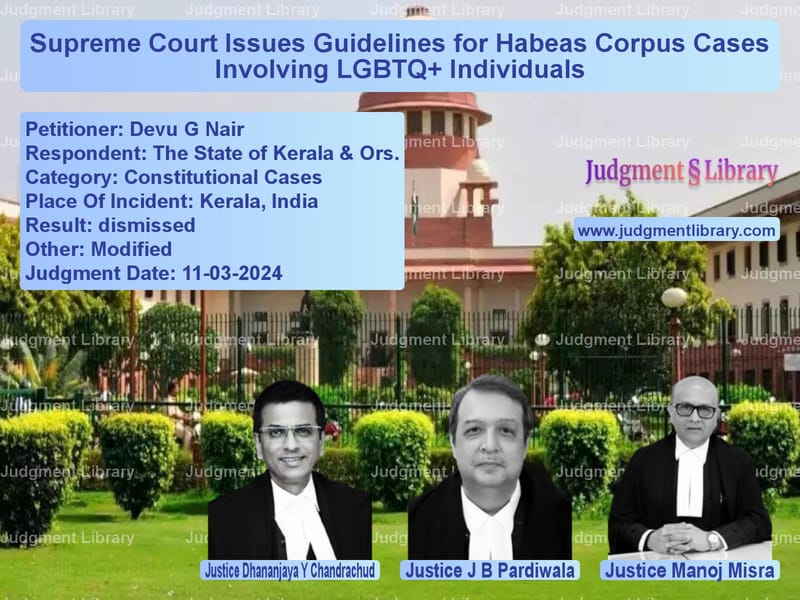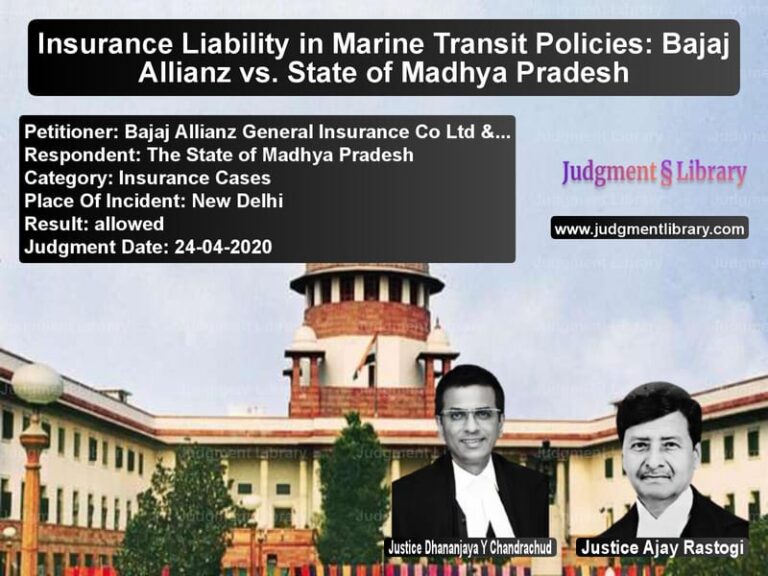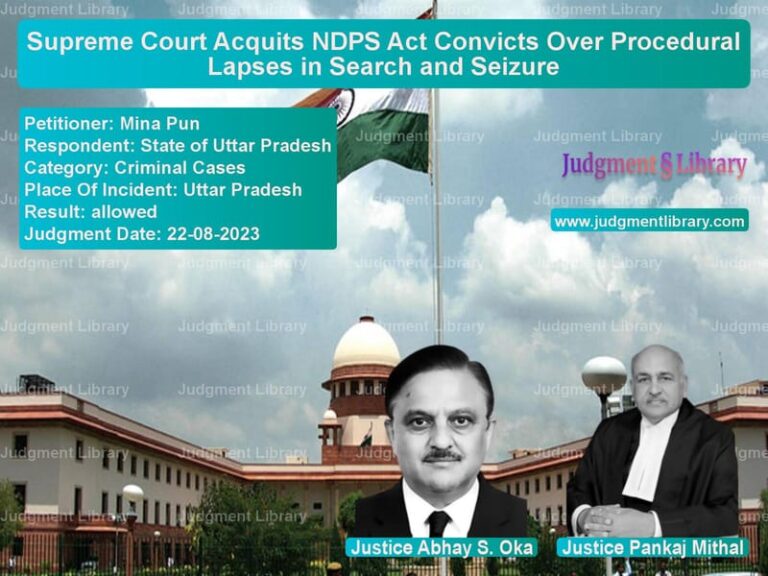Supreme Court Issues Guidelines for Habeas Corpus Cases Involving LGBTQ+ Individuals
The Supreme Court of India recently delivered a landmark judgment in the case of Devu G Nair v. The State of Kerala & Ors., addressing the rights of individuals in same-sex relationships and establishing clear guidelines for handling habeas corpus petitions involving LGBTQ+ persons. The case stemmed from a petition filed by the appellant seeking a writ of habeas corpus, claiming that her partner was being unlawfully detained by her parents.
Background of the Case
The appellant, Devu G Nair, and the detained individual, referred to as ‘X’ in court records, were both adult females allegedly in an intimate relationship. The appellant filed a habeas corpus petition in the Kerala High Court, asserting that X was being forcibly kept by her parents against her will.
On 13 January 2023, the Kerala High Court directed the District Legal Services Authority (DLSA) to visit X’s residence and record her statement. On 2 February 2023, after interacting with X, the High Court ordered her to undergo counseling with a psychologist attached to a counseling center. Dissatisfied with the order, the appellant approached the Supreme Court.
Petitioners’ Arguments
The appellant’s counsel raised the following concerns:
- X, as an adult, should have the right to choose where and with whom she resides.
- The Kerala High Court’s directive for counseling was unnecessary and could lead to coercion aimed at changing X’s sexual orientation.
- The process of determining whether X was in unlawful custody should not involve family influence or pressure.
- Courts should recognize the concept of “chosen family” for LGBTQ+ individuals, as natal families often do not respect their choices.
Respondents’ Arguments
The State and X’s parents argued:
- X was voluntarily residing with her parents and was not under illegal detention.
- The High Court’s directive for counseling was intended to provide emotional and psychological support, not to influence her choices.
- X was not interested in pursuing a relationship with the appellant and was focused on her career.
Supreme Court’s Observations
The Supreme Court examined reports submitted by the Family Court in Kollam and Judicial Officer Ms. Saleena V.G. Nair, who interacted with X in a neutral setting. The Court concluded that:
- X was a major and had completed her master’s degree in arts.
- She expressed a desire to focus on her career and stated that she was residing with her parents out of her own volition.
- While acknowledging the appellant as an “intimate friend,” she explicitly stated that she did not wish to marry or live with anyone at that point.
The Supreme Court found no reason to doubt the report and dismissed the habeas corpus petition. However, it took the opportunity to address broader concerns regarding LGBTQ+ rights and judicial processes in similar cases.
Key Judicial Remarks
The Court strongly cautioned against using counseling as a tool to suppress an individual’s identity:
“Ascertaining the wishes of a person is one thing, but it would be completely inappropriate to attempt to overcome the identity and sexual orientation of an individual by a process of purported counseling.”
The Court further emphasized the importance of recognizing chosen families for LGBTQ+ individuals:
“Courts must bear in mind that the concept of ‘family’ is not limited to natal family but also encompasses a person’s chosen family. This is especially significant for LGBTQ+ persons who may face violence and lack of safety within their natal family.”
Guidelines Issued by the Supreme Court
Recognizing the need for uniform procedures in cases involving habeas corpus petitions and protection for LGBTQ+ individuals, the Supreme Court issued a set of mandatory guidelines:
- Priority Hearing: Courts must give priority to habeas corpus petitions and protection pleas involving intimate partners.
- Non-Intrusive Inquiry: Courts must avoid excessive questioning about the nature of relationships between petitioners.
- In-Camera Proceedings: Individuals must be given the opportunity to speak privately with judges, without the presence of parents or opposing parties.
- Judicial Sensitivity: Judges must ensure that personal biases do not influence their assessment of the case.
- No Forced Counseling: Courts should not direct counseling as a means of altering sexual orientation or gender identity.
- Privacy and Dignity: Police protection should be provided to individuals seeking to live independently from their natal families.
- Recognition of Chosen Families: The legal system should acknowledge that LGBTQ+ individuals often rely on chosen families for support.
Final Judgment
The Supreme Court dismissed the appeal, affirming that X was residing with her parents out of free will. However, it set aside the High Court’s direction for counseling and established these guidelines to safeguard LGBTQ+ individuals in future cases.
Conclusion
This judgment marks a significant step toward ensuring dignity and autonomy for LGBTQ+ individuals in India. The Supreme Court’s recognition of chosen families and its caution against coercive counseling reinforce the constitutional principles of equality, privacy, and freedom of choice.
Petitioner Name: Devu G Nair.Respondent Name: The State of Kerala & Ors..Judgment By: Justice Dhananjaya Y Chandrachud, Justice J B Pardiwala, Justice Manoj Misra.Place Of Incident: Kerala, India.Judgment Date: 11-03-2024.
Don’t miss out on the full details! Download the complete judgment in PDF format below and gain valuable insights instantly!
Download Judgment: devu-g-nair-vs-the-state-of-kerala-supreme-court-of-india-judgment-dated-11-03-2024.pdf
Directly Download Judgment: Directly download this Judgment
See all petitions in Fundamental Rights
See all petitions in Public Interest Litigation
See all petitions in Separation of Powers
See all petitions in Judgment by Dhananjaya Y Chandrachud
See all petitions in Judgment by J.B. Pardiwala
See all petitions in Judgment by Manoj Misra
See all petitions in dismissed
See all petitions in Modified
See all petitions in supreme court of India judgments March 2024
See all petitions in 2024 judgments
See all posts in Constitutional Cases Category
See all allowed petitions in Constitutional Cases Category
See all Dismissed petitions in Constitutional Cases Category
See all partially allowed petitions in Constitutional Cases Category







